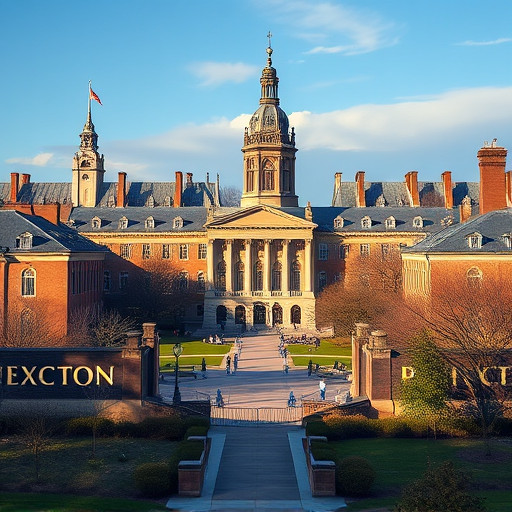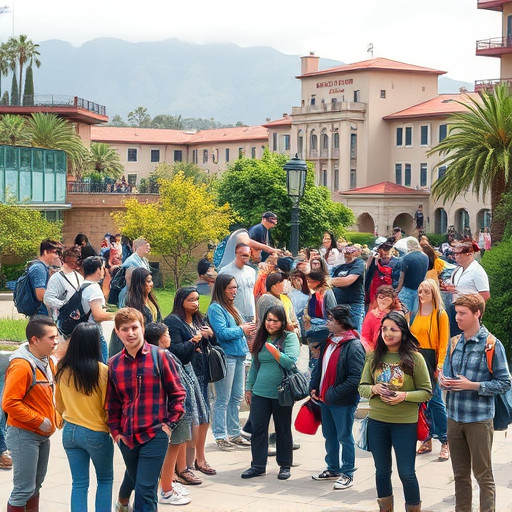Exploring Princeton University – A Premier Choice for Education in the U.S

Princeton University: One of the top universities in the U.S., is a prestigious institution that has long been recognized for its exceptional academic programs and commitment to research excellence. With a rich history that dates back to 1746, this Ivy League university stands out not only for its academic rigor but also for its vibrant campus life, historical charm, and influential alumni. The significance of Princeton University: One of the top universities in the U.S., lies in its profound impact on higher education and its contribution to various fields through innovative research and scholarship.
Princeton University: One of the top universities in the U.S.
When exploring Princeton University: One of the top universities in the U.S., it’s essential to understand what sets it apart. Beyond just a location for higher learning, Princeton has cultivated an environment where intellectual curiosity thrives, enabling students to engage deeply with complex ideas, diverse perspectives, and innovative projects. The university prides itself on delivering a comprehensive liberal arts education, emphasizing the importance of critical thinking, creativity, and ethical reasoning.
Rich Historical Context
Princeton’s establishment as the College of New Jersey in 1746 reflects a legacy steeped in American history. Over the years, it evolved into Princeton University, symbolizing a commitment to providing high-quality education grounded in Christian values during its inception. This historical context contributes significantly to its identity.
The architecture across the campus narrates this rich heritage, with iconic buildings like Nassau Hall and the Graduate College showcasing stunning Gothic and Colonial styles. Walking through the campus allows visitors and students alike to experience an atmosphere that resonates with tradition and scholarly pursuit.
Academic Structure
At Princeton University: One of the top universities in the U.S., the academic structure emphasizes a unique blend of undergraduate and graduate programs. The undergraduate program is distinctive for its small class sizes, fostering personal attention from faculty members. Students are encouraged to engage in independent research projects, culminating in a senior thesis that showcases their knowledge and skills.
Graduate studies at Princeton are equally impressive, particularly in fields such as the sciences, humanities, and social sciences. The Ph.D. programs are highly competitive, attracting some of the brightest minds and allowing for interdisciplinary work that often leads to groundbreaking discoveries.
Student Life and Diversity
Princeton’s commitment to a well-rounded educational experience extends beyond academics. The university promotes a diverse and inclusive community, encouraging students from various backgrounds to share their experiences and insights. Numerous student organizations cater to a wide range of interests, from cultural clubs to performance groups, enhancing the campus experience.
Additionally, Princeton’s location in New Jersey offers students opportunities for cultural enrichment, outdoor activities, and engagement with global issues, making it more than just a place to study—it’s a place to grow personally and socially.
Networking and Alumni Influence
The influence of Princeton University: One of the top universities in the U.S. is magnified by its extensive network of successful alumni. From former presidents and Supreme Court justices to Nobel laureates and CEOs of Fortune 500 companies, Princeton graduates are leaders in virtually every sector.
This powerful alumni network enriches the student experience through mentorship opportunities, internships, and career guidance. Engaging with accomplished individuals who have navigated similar paths provides current students with invaluable resources and connections that can shape their future.
Known for its research programs and academic excellence.
Princeton University: One of the top universities in the U.S. is also renowned for its robust research initiatives. The university invests heavily in research across various disciplines, promoting a culture of inquiry and exploration. It aims to address significant societal challenges while contributing to the advancement of knowledge.
Research Programs Overview
Research at Princeton is characterized by its interdisciplinary collaboration, allowing scholars to tackle complex problems from multiple angles. The university hosts numerous research centers and institutes, focusing on areas such as neuroscience, energy, and social policy. These programs are designed to foster innovation and encourage participants to think critically about real-world issues.
Moreover, the university’s commitment to undergraduate research is evident in the opportunities provided for students to engage in hands-on projects alongside faculty members. This approach not only enhances learning outcomes but also cultivates a sense of ownership and responsibility among students regarding their contributions to society.
Funding and Resources
To support its ambitious research agenda, Princeton allocates substantial funding dedicated to various projects and initiatives. Grants from government agencies, private foundations, and alumni contributions provide critical financial backing for innovative research endeavors.
Access to state-of-the-art facilities and technology further enhances the research capabilities at Princeton. Laboratories, libraries, and collaborative workspaces enable researchers to conduct their work efficiently and effectively.
Global Impact of Research
Princeton’s research extends far beyond the campus, contributing to impactful solutions on a global scale. Faculty and students regularly collaborate with institutions worldwide to address pressing issues, ranging from climate change to public health crises. This global perspective aligns with Princeton’s mission to promote “the national interest” and prepare future leaders who can navigate complex, interconnected challenges.
The research programs at Princeton not only advance academic understanding but also translate into practical applications that benefit society. This dual focus reinforces the idea that academia should play an active role in addressing contemporary challenges, further solidifying Princeton’s reputation as a leader in research and innovation.
Publications and Contributions
The academic excellence at Princeton is reflected in the extraordinary quality of research publications produced by its scholars. Faculty members regularly publish articles in prestigious journals, contributing to advancements in their respective fields and setting benchmarks for others within academia.
Additionally, Princeton encourages interdisciplinary collaboration, leading to innovations that transcend traditional boundaries. This dynamic approach enables researchers to explore new avenues of inquiry, ultimately enriching the academic landscape and enhancing the university’s prestige.
Pros and cons of attending Princeton University
Considering Princeton University: One of the top universities in the U.S. comes with its advantages and potential challenges. Understanding both sides is crucial for prospective students in making informed decisions.
Advantages of Attending Princeton
The most compelling reason to attend Princeton is the unparalleled academic experience offered. With world-class faculty members and strong emphasis on research, students receive a rigorous education tailored to prepare them for future success.
Furthermore, the close-knit community allows for meaningful connections and networking opportunities. Engaging with professors and fellow students fosters a collaborative learning environment, which can be incredibly beneficial for personal and professional growth.
Another significant advantage is the abundance of resources available to students. From libraries and research grants to mental health services and career counseling, Princeton ensures that students have the support they need to thrive both academically and personally.
Disadvantages of Attending Princeton
Despite its many virtues, attending Princeton does come with challenges. One notable aspect is the pressure associated with being part of such a prestigious institution. The high expectations set by both faculty and peers can create a competitive atmosphere that may be overwhelming for some students.
Additionally, the cost of attendance can be a barrier. While Princeton provides generous financial aid, the overall expense of living in New Jersey and attending an Ivy League school can still pose challenges for families.
Lastly, some students might find the culture at Princeton to be insular. The combination of social dynamics and the university’s history may create a sense of exclusivity that could alienate those who don’t fit the typical profile of a Princeton student.
Alternatives to Princeton University
While Princeton University: One of the top universities in the U.S. is undoubtedly a top choice, there are other institutions offering comparable quality education and research opportunities. Exploring these alternatives can help prospective students discover schools that align better with their individual aspirations and needs.
Ivy League Schools
Other Ivy League institutions like Harvard, Yale, and Columbia present similar levels of academic rigor and research opportunities. Each has unique strengths, whether in specific programs or campus cultures, making them worthy alternatives for students seeking excellence.
Liberal Arts Colleges
For those interested in smaller, more intimate educational environments, liberal arts colleges such as Swarthmore, Williams, and Amherst offer rigorous academics and a strong emphasis on undergraduate education. These institutions often cultivate close relationships between students and faculty, similar to Princeton’s offerings.
Public Research Universities
Public research universities such as the University of California, Berkeley, and the University of Michigan deliver outstanding academic programs and research opportunities at potentially lower costs. They attract talented faculty and students, ensuring a vibrant intellectual community that rivals even the best Ivy League schools.
Steps to Apply to Princeton University
If you’ve decided that Princeton University: One of the top universities in the U.S. might be right for you, understanding the application process is crucial.
Research the Requirements
Begin by thoroughly researching Princeton’s admission requirements. Familiarize yourself with standardized test scores, GPA averages, essays, and letters of recommendation needed for your application.
Prepare Your Application
Put together a well-crafted application that highlights your academic achievements, extracurricular involvement, and personal passions. Take time to reflect on your experiences and how they have shaped your ambitions. Personal essays are particularly important, as they provide insight into who you are beyond your grades and test scores.
Submit Before Deadlines
Ensure that you submit all required materials before the deadlines outlined on Princeton’s website. Late submissions are typically not accepted, so staying organized is key.
Follow Up
After submitting your application, consider following up with the admissions office if necessary. It’s also beneficial to stay engaged through campus events and outreach opportunities to demonstrate your continued interest.
Tips for Succeeding at Princeton University
Once you’re accepted, succeeding at Princeton University: One of the top universities in the U.S. requires strategic efforts.
Time Management Skills
Effective time management is vital for balancing coursework, research, and extracurricular activities. Develop a schedule that allows flexibility while ensuring you allocate sufficient time for studying and personal commitments.
Build a Support Network
Engage with peers, professors, and advisors who can provide guidance and encouragement. Building a strong support network can help you navigate the challenges of university life and enhance your academic experience.
Embrace Opportunities
Take full advantage of the resources available to you. Participate in workshops, research programs, and networking events to expand your horizons and gain valuable skills that will serve you beyond your time at Princeton.
Stay Resilient
Academia can be demanding, so cultivating resilience is essential. Embrace challenges as opportunities for growth and remain open to feedback. Remember that persistence is often the key to success.
FAQs
What is the acceptance rate at Princeton University?
The acceptance rate at Princeton University is competitive, reflecting the high number of applicants compared to the limited number of spots available. A low acceptance rate indicates the quality and selectiveness of the institution.
Does Princeton University offer financial aid?
Yes, Princeton University offers generous financial aid packages based on need. The university is committed to making education accessible to all students, regardless of their financial background.
What majors are offered at Princeton University?
Princeton University provides a wide range of majors spanning various disciplines, including humanities, social sciences, natural sciences, and engineering. This diversity allows students to pursue their interests in-depth.
Is research a significant component of the undergraduate experience?
Absolutely! Research is a core component of the undergraduate experience at Princeton, with opportunities for students to engage directly with faculty on innovative projects and contribute to meaningful scholarship.
What is the campus culture like at Princeton University?
The campus culture at Princeton is characterized by its dedication to academic excellence, a sense of community, and diverse student engagement. Students are encouraged to connect through clubs, organizations, and traditions, creating a rich campus experience.
Conclusion
In summary, Princeton University: One of the top universities in the U.S. embodies a commitment to academic excellence, research innovation, and a supportive community. Its historical significance, combined with a strong emphasis on intellectual growth and personal development, positions Princeton uniquely within the realm of higher education.
Whether considering applying or stepping onto the campus for the first time, understanding Princeton’s offerings and embracing the challenges and opportunities available can lead to transformative experiences. As you embark on this journey, remember that your story and aspirations are what will ultimately shape your time at one of America’s most prestigious universities. The possibilities for growth, knowledge, and leadership await at Princeton, ready to unfold as you take your place in this esteemed institution.



Leave a Comment